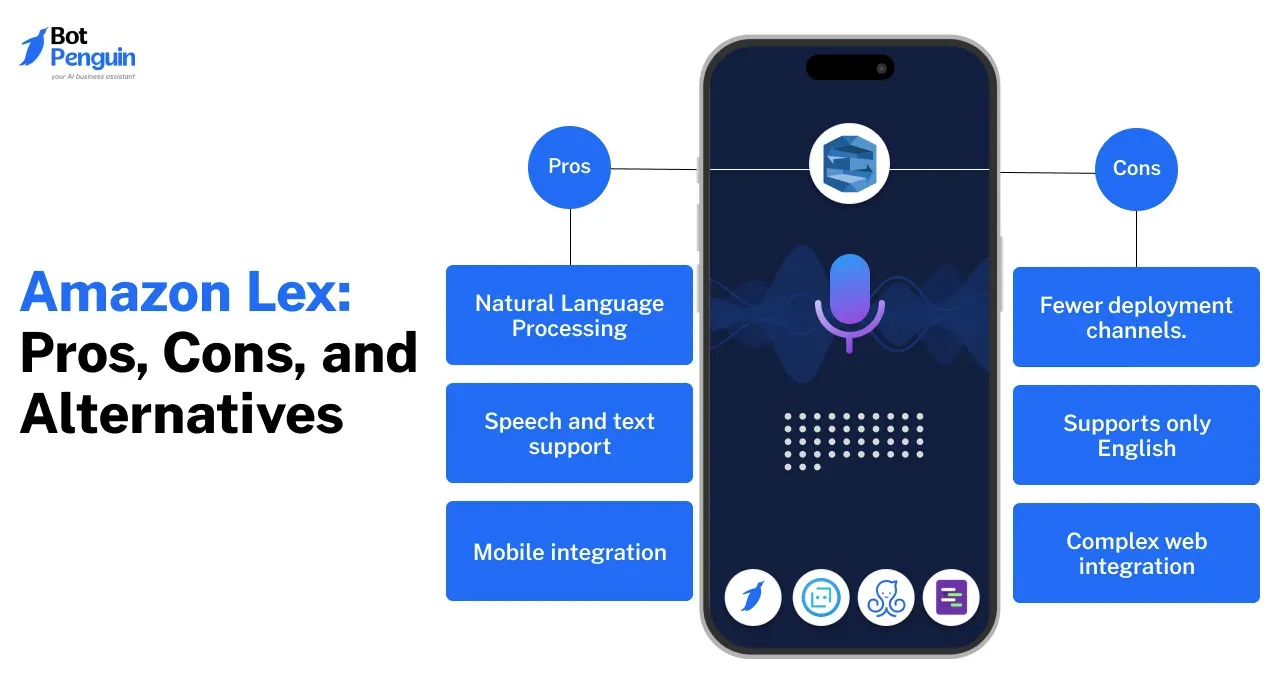With Amazon Lex, you can create conversational voice and text interfaces. You can use Amazon Lex to build a chatbot and embed it in your application.
Mainly Amazon Lex service uses the same deep learning engine as Amazon Alexa.
Internally, Amazon Lex uses automatic speech recognition (ASR) to convert speech to text and natural language understanding (NLU) to understand the text's implication.
Amazon Lex allows you to quickly build engaging chatbots that protect you from the complexity of speech recognition and natural language understanding.
A chatbot is a computer program made to have conversations with humans. The latest advances in AI technology, such as natural language processing, have made chatbots able to talk more profound, more prolonged, and more naturally with humans.
At its core, Amazon Lex provides high-quality speech and text comprehension. Developers can take advantage of these features through a simple and intuitive dashboard that is extremely easy to use.
You can create from scratch a fully working chatbot system in minutes. More advanced chatbot setups may take longer. Amazon Lex is a cost-effective solution.
As with most AWS services, Amazon Lex has no upfront fees and offers discretionary pricing. Amazon Lex provides deployment features to let you quickly and easily deploy your chat interfaces across multiple environments, using a combination of aliasing and versioning.
With Amazon Lex, you can scale without worrying about bandwidth because Amazon Lex imposes no bandwidth limits. Amazon Lex is integrated with several other AWS services. In particular, Amazon Lex uses AWS Lambda to authenticate and execute business logic.
Amazon Lex trains its internal models using machine learning technologies. Natural language understanding (NLU) and automatic speech recognition (ASR) for speech-to-text give sophisticated ways to translate your voice and text requests into usable commands.
You can implement some of the commercial use cases listed below with Amazon Lex. You can order dinner using a chatbot for commerce.
You can connect to data resources with the help of an enterprise chatbot. Customer service and FAQs are provided automatically by the Support ChatBot. Health ChatBot responds to inquiries about your health and lets you schedule a follow-up consultation.
Amazon Lex offers all the functionality required to develop, implement, scale, and monitor your chatbot solutions as a fully managed service. Let's quickly review the high-level build procedures needed to create a chatbot using Amazon Lex. You first build a bot.
All remaining configurations unique to a given bot within Amazon Lex are contained in a bot. The intentions that your bot will execute must be defined next. Ordering dinner or renting a car are two examples of intentions. Each purpose will call for one or more utterances that serve as its activation or start.
The Financial Aspect of Lex
The pricing structure for Amazon Lex adheres to the standard AWS pricing structures you are accustomed to. You pay for what you use while using Amazon Lex.
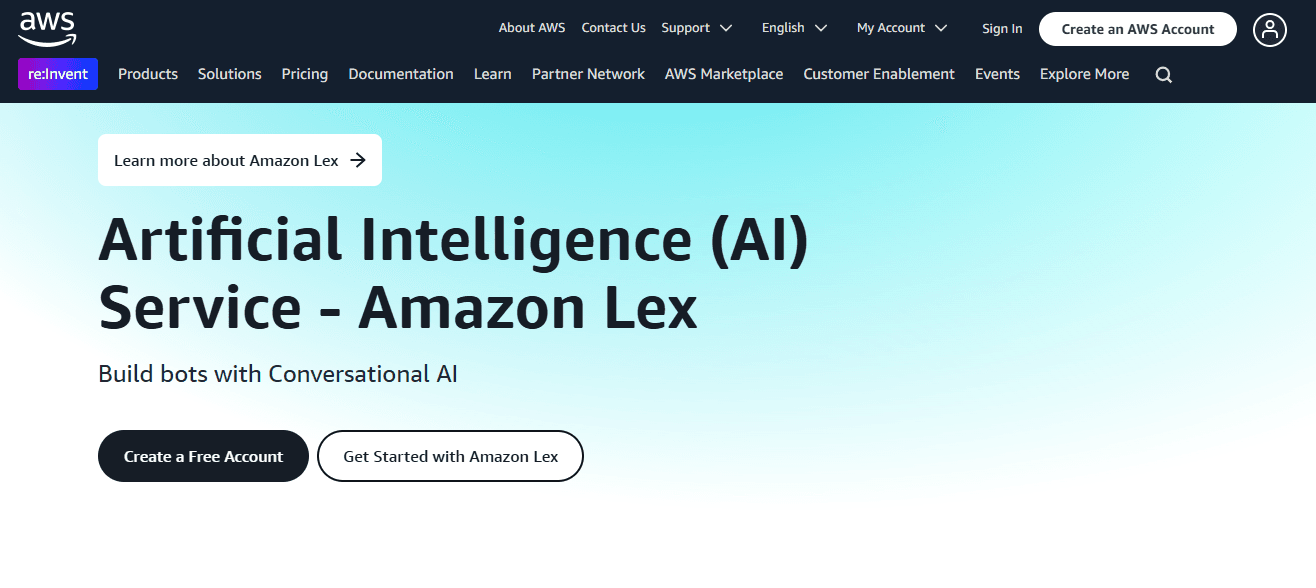
Your pay depends on how many text or voice inquiries your chatbot manages. Pricing for voice requests starts at $0.004 and for text requests from $0.00075.
Let's go over a price example step by step. The price would be $8 if your chatbot application handled 2,000 voice queries.
The cost would be $1.50 if your chatbot program performed 2,000 text inquiries. Processed requests measure your usage and are totaled together at the end of each month to determine your monthly rates.
You should note that Amazon offers a free tier option for Amazon Lex, allowing you to try the service. For the first year after signing up for Amazon Lex, you are free to handle up to 10,000 text queries and 5,000 speech requests each month.
Amazon Lex Chatbot: Features at a Glance
The features of amazon lex chatbot are:
Natural Conversions
Amazon Lex offers automatic speech recognition and natural language understanding capabilities to construct a Speech Language Understanding system.
The same tested technology that powers Alexa also powers Amazon Lex. Based on a small number of example utterances that the developer provided, Amazon Lex can learn the various ways users can communicate their purpose.
The spoken language understanding system accepts natural language speech and text input, decodes the user's intent, and then invokes the appropriate response to carry out the user's intent.
Context Management
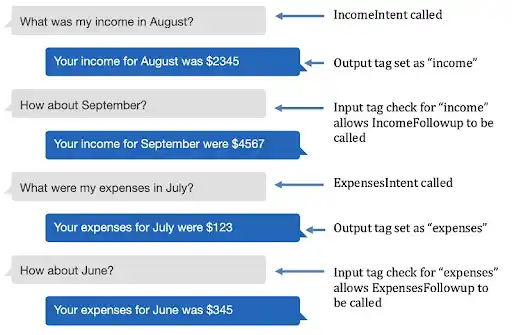
Managing context across multi-turn discussions is necessary for proper utterance classification as the conversation progresses. Thanks to Amazon Lex's inherent support, you may control the context without using additional code.
You can "context-create" intents to activate related intents as initial necessary intents are satisfied. It facilitates the building of conversational experiences and simplifies bot design.
Multi-Turn Dialog and 8kHz Audio Sampling
For improved voice recognition accuracy for telephone use-cases, the Amazon Lex speech recognition engine has been trained on telephony audio (8 kHz sampling rate).
The 8 kHz capability for telephone speech interactions, such as through a contact center application or helpdesk, allows for improved fidelity when developing a conversational bot with Amazon Lex.
With Amazon Lex bots, you can have discussions that go on for several turns. Users will be asked for the data necessary to complete an intent after it has been discovered.
For instance, if an intent is to "Book a hotel," the user will be asked for the location, the check-in date, the number of nights, etc. You can easily create multi-turn discussions for your chatbots using Amazon Lex.
Build Productivity
You can use Amazon Lex versioning on the Intents, Slot Types, and Bots you develop. Thanks to versioning and rollback features, you can manage code while testing and deploying in a multi-developer environment.
Each Amazon Lex bot can have numerous aliases, each of which can be assigned a distinct version, such as "production," "development," and "test."
It enables you to keep modifying the bot and releasing updated versions under a single alias. It eliminates the need to update every client once a new bot version is released.
One-Click Deployment to Multiple Platforms

With Amazon Lex, you can quickly publish your bot to chat services from the Amazon Lex UI, minimizing the need for cross-platform development.
Rich formatting options offer a user interface for chat applications like Facebook Messenger, Slack, and Twilio SMS.
A Better Console Experience
Building, deploying, and managing conversational experiences is made simpler by the Lex V2 console experience.
A new language may be added to a bot at any moment using Lex V2, and all languages can be managed as a single resource throughout the design, test, and deployment phases.
You can manage your bot versions effectively with streamlined information architecture.
The procedure is streamlined, and you have more flexibility with features like "Conversation Flow," "saving of partially configured bots," and "bulk upload of utterances."
Streaming Conversations
Pauses and interruptions are common in everyday talks. For instance, a caller might ask to hold the line open or stop the discussion while seeking the required facts before responding to a question.
As you set up the bot, you may pause a chat and deal with disruptions directly, thanks to streaming conversation APIs. Intelligent assistants or virtual contact center representatives might easily have more conversational skills.
Integration with Amazon Kendra
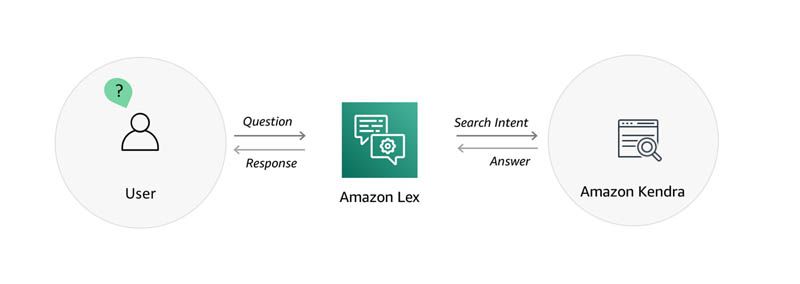
Finding precise information to address various concerns is common during customer support calls. You can use Amazon Kendra to access a machine learning-powered, highly accurate, and user-friendly intelligent search tool.
You can add a Kendra search purpose to discover the most precise answers from unstructured texts and FAQs. To increase the bot's informational capabilities, you define the search index settings in the intent.
Amazon Polly

Polly converts text into realistic speech, enabling you to design new categories of speech-enabled products and talkative applications. In verbal interactions with your users, Polly can respond.
Along with Standard TTS voices, Amazon Polly now provides Neural Text-to-Speech (NTTS) voices, which use new machine learning techniques to improve speech quality.
Integration with AWS Lambda
Data retrieval, updates, and the execution of business logic are all natively supported by Amazon Lex's interface with AWS Lambda. While you concentrate on creating bots, the serverless compute capability enables effortless execution of business logic at scale.
You may easily combine your enterprise applications and databases with AWS Lambda from Lambda. Create your integration code, and AWS Lambda will execute it whenever data has to be sent to or received from an external system is required.
Various AWS services are available, including Amazon DynamoDB for preserving the discussion state and Amazon SNS for alerting users.
Suggested Reading:
Why Amazon Lex is a game-changer for customer service
Contact Center Integrations
Because Amazon Lex and Amazon Connect are internally connected, programmers can create conversational bots that can respond to client inquiries via chat or phone.
You can include Amazon Lex into any call center application using the APIs. For additional information, please see Amazon Connect integration.
Genesys Cloud CX
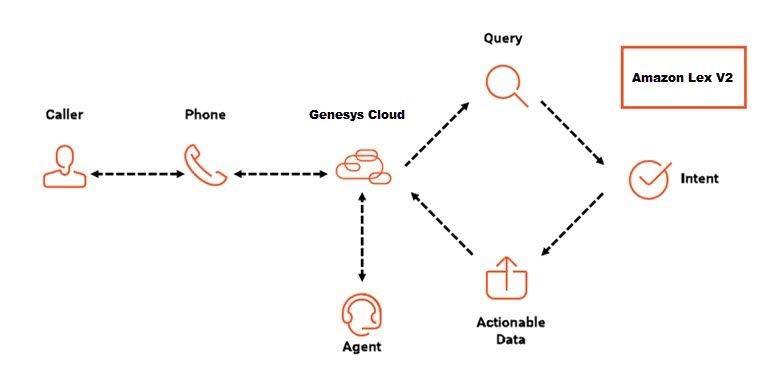
A cloud contact center solution called Genesys Cloud CX combines customer and agent interactions across several channels like phone, text, and chat.
You can deploy your speech and text bots on the Genesys Cloud platform to enable self-service interactions and boost client engagement. For further details, please see Genesys Cloud Integration.
Amazon Chime SDK
Developers can instantly add voice calling, video calling, and screen sharing capabilities to their web, mobile, or telephony applications using the Amazon Chime SDK. It is a collection of real-time communications components.
In contact centers that employ Session Initiation Protocol (SIP) for voice communication, you may quickly provide conversational experiences powered by Amazon Lex. It's due to the integration between Amazon Chime SDK and Amazon Lex.
AWS Contact Center Intelligence (CCI)
You may easily construct self-service customer care virtual agents and informational bots.
Also, you can create application bots because many AWS CCI partners use Amazon Lex. Infosys, Quantiphi, and Xapp.ai are among the partners of Amazon Lex.
The Pros of Amazon Lex

- SDK support – You can build iOS, Android, Java, JavaScript, Python, .Net, Ruby, PHP, Go, and C++ bots that span mobile, web, desktop, and IoT platforms.
- Natural Language Processing
- Speech and text support
- Utterance Monitoring
- AWS lambda integration
- SaaS Connectors
- Mobile integration
Suggested Reading:
How Amazon Lex can streamline your customer support
The Cons of Amazon Lex
- Complex web integration.
- Fewer deployment channels.
- Lex is not multilingual and supports only English.
- The data set preparation is complicated; the utterances and entity mapping are somewhat critical.
Some Great Alternatives to Amazon Lex Chatbot
There are some alternatives of amazon lex chatbot:
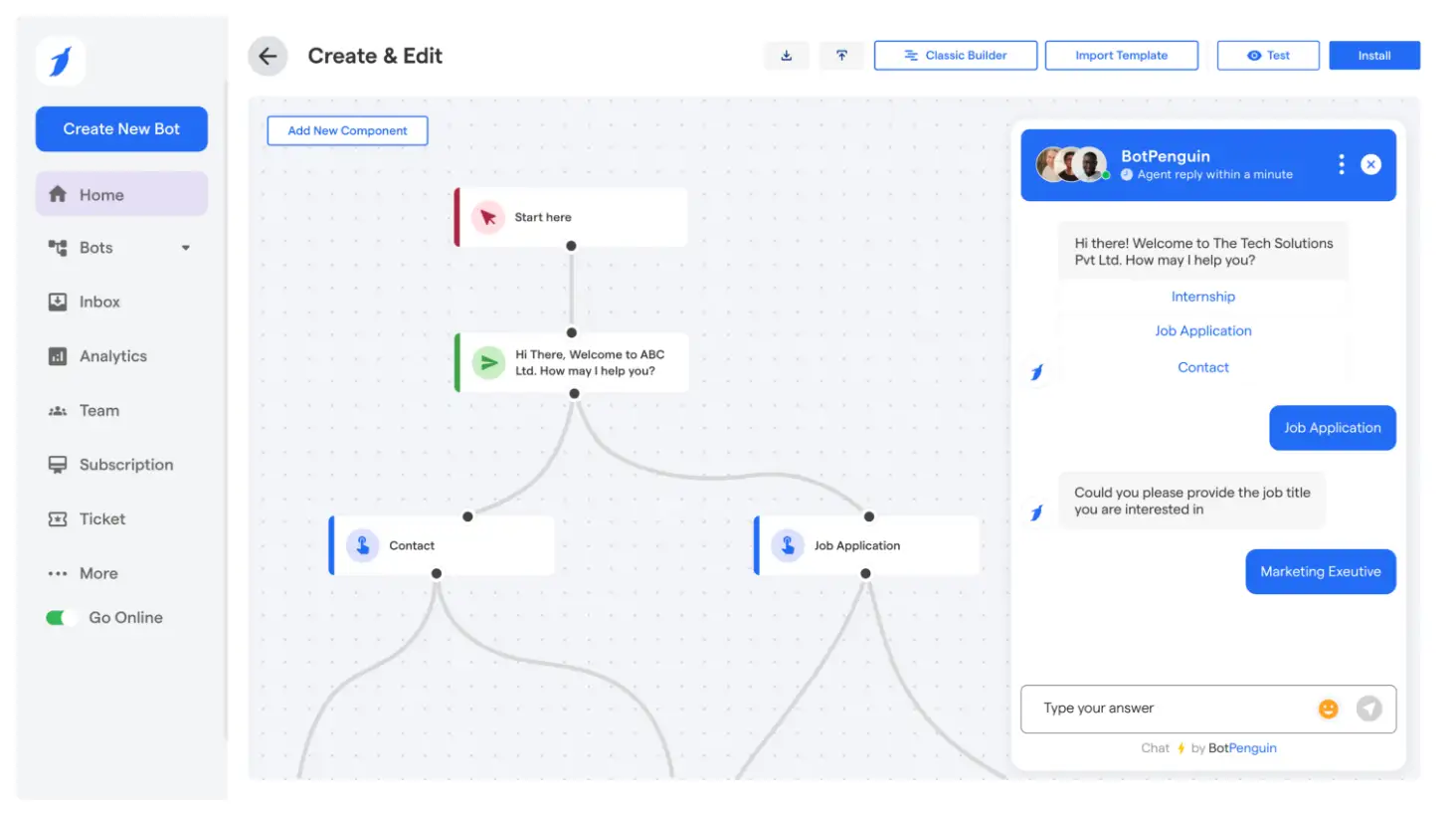
- Botpenguin: The AI-powered chatbot platform BotPenguin lets you create amazing chatbots for your website, Facebook Messenger, and other platforms to interact with and engage your clients.
- IBM Watson Assistant: IBM Watson Assistant is a virtual assistant platform that automates consumer interactions, helping them solve problems through virtual agents/chatbots over digital and audio channels. AI techniques used include natural language comprehension and machine learning.
- Google Cloud Dialogflow: A complete development toolkit for creating conversational user interfaces for websites, mobile applications, popular messaging services, and Internet of Things (IoT) gadgets is called Google Cloud Dialogflow.
- Microsoft Azure Bot: Language Understanding (LUIS) enables developers to create tailored natural interactions on any platform for any application, including bots. In contrast, Azure Bot Service enables developers to construct conversational interfaces on many channels.
- ManyChat: You may build a Facebook Messenger bot with ManyChat for marketing, sales, and customer support. It is simple and free.
- Verloop.io: Using lead generation, demo scheduling, and e-commerce automation, the live chat platform Verloop.io automates customer support and engagement.
- TARS: TARS is an excellent platform for users to create chatbots without programming knowledge.
Conclusion
Amazon Lex made the creation of your bot simpler than you would have imagined. It is simple to use and can be linked with other AWS services, making the development of your bot simple.
Your bot could be programmed with intent. Then, you may include a variety of utterances to enable your bot to interpret words written in natural language to ascertain the intent of user requests. Another option is to combine it with AWS Lambda to handle user requests and have your bot show them the outcome.
Amazon Lex offers fully automatic voice recognition and natural language understanding technology to create a speech-language recognizing system. Its bots allow for dialogues with multiple turns. It supports native context control, allowing instant context management without needing unique code.
It offers both confirmation prompts and instructions for addressing errors.
It can natively execute commercial enterprise logic, fact retrieval, updates, and integration with AWS Lambda. With no need for cross-platform programming, you can easily publish your bot to chat services from the Amazon Lex console.
Overall it is one of the best platforms for developing chatbots but just is held by the lack of multiple language support.
